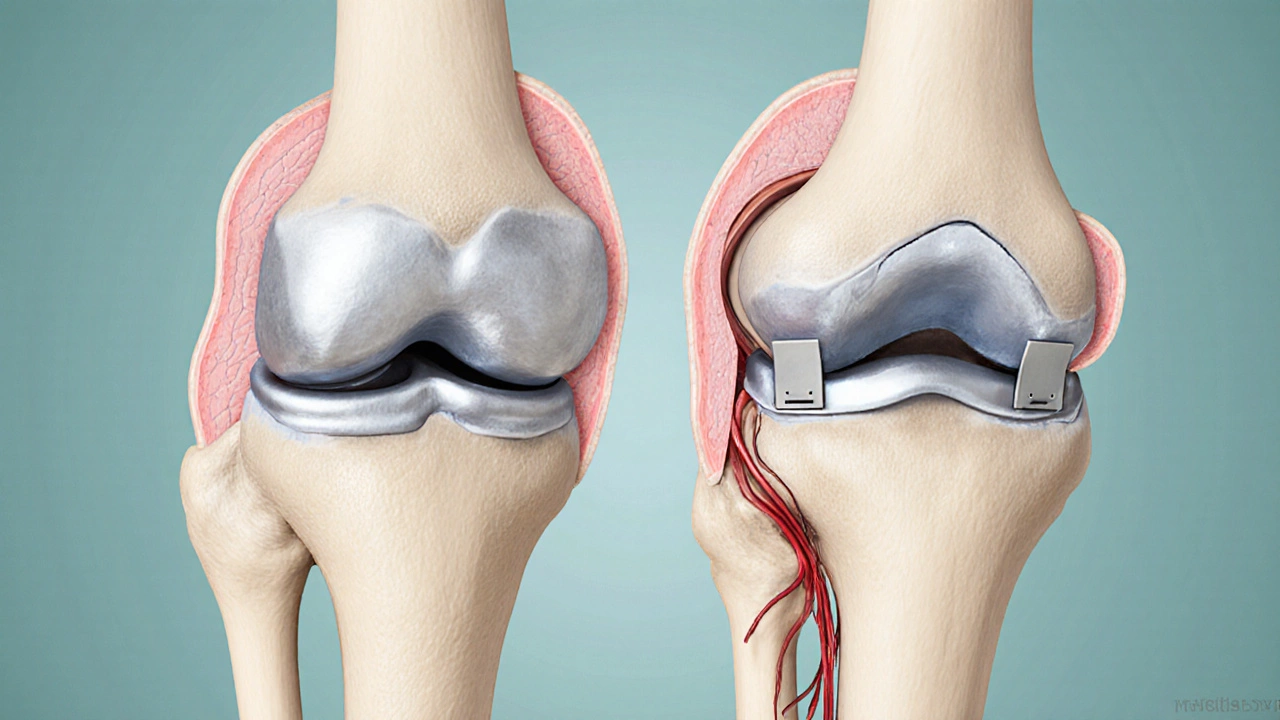Knee Replacement Age Guide
Surgery Recommendation
- Age Range: Most surgeries occur between 60-80 years
- Bone Quality: Osteoporosis affects implant anchoring
- Activity Demand: High impact increases wear
- Implant Longevity: 15-20 years average lifespan
- Health Status: Comorbidities increase surgical risk
Key Takeaways
- Knee replacement isn’t bound by a strict legal age; most surgeons consider patients 60‑80years old.
- Bone quality, activity level, overall health and implant longevity drive the decision more than age alone.
- Younger patients (under 55) may be offered joint‑preserving options such as partial replacement or osteotomy.
- Pre‑operative assessment includes imaging, blood tests, cardiovascular clearance and a discussion of lifestyle goals.
- Recovery pathways are similar across ages, but older adults often need a longer rehabilitation period.
What is a Knee Replacement?
Total knee replacement is a surgical procedure that removes damaged cartilage and bone from the knee joint and substitutes them with artificial components called implants. The operation is officially known as total knee arthroplasty (TKA) and is most commonly performed to relieve pain from end‑stage osteoarthritis.
Typical Age Range for the Procedure
In the United States and most Western countries, the average age of patients undergoing TKA lies between 65 and 75years. In India, especially in urban centres like Bangalore, the median age has nudged lower to the early 60s because of higher activity levels and earlier onset of joint wear.

Why There Is No Hard Cut‑Off Age
Orthopedic societies such as the American Academy of Orthopaedic Surgeons (AAOS) and the Indian Orthopaedic Association (IOA) deliberately avoid prescribing a fixed age limit. Their guidelines state that the decision should be "patient‑centred" and based on multiple clinical factors.
- Implant longevity: Modern implants last 15‑20years on average. If a 45‑year‑old receives a knee replacement, they may need a revision surgery later.
- Bone quality: Osteoporosis, more common after 70, can affect how well the implant anchors.
- Comorbidities: Diabetes, heart disease, or chronic respiratory issues raise surgical risk regardless of age.
- Activity demand: High‑impact sports place more stress on an artificial joint than low‑impact activities.
Key Factors Surgeons Look At
When you walk into the clinic, the surgeon will evaluate the following:
- Radiographic severity - X‑rays or MRI showing joint space narrowing, bone spurs, or deformity.
- Patient‑reported pain scores and functional limitations (e.g., inability to climb stairs).
- General health assessment - blood pressure, cardiac function, lung capacity.
- Bone density test (DEXA) if osteoporosis is suspected.
- Expectations - what activities the patient wants to return to after surgery.
Alternatives for Younger Patients
If you’re under 55 and still fairly active, surgeons often recommend joint‑preserving options that delay the need for a full replacement.
| Procedure | Typical Age Range | Invasiveness | Recovery Time | Implant Longevity |
|---|---|---|---|---|
| Partial knee replacement | 50‑70 | Moderate - only one compartment resurfaced | 3‑4 weeks | 12‑15 years |
| Total knee replacement | 60‑80 | High - entire joint replaced | 6‑12 weeks | 15‑20 years |
| High tibial osteotomy | 40‑60 | High - bone cut & realignment | 4‑6 weeks | Delay TKR by 10‑15 years |
Preparing for Surgery - What Changes With Age?
Whether you’re 58 or 78, pre‑hab (pre‑operative physiotherapy) remains crucial. Older adults may benefit from:
- Strengthening quadriceps and hamstrings to support the new joint.
- Balance training to reduce fall risk post‑op.
- Medical optimisation - controlling blood sugar, smoking cessation, and reviewing medications that affect clotting.
During the hospital stay, pain control protocols (often a mix of regional anaesthesia and oral meds) are tailored to minimise opioid use, which is especially important for seniors.

Recovery Expectations Across Ages
Typical milestones:
- Day 1-2: Sit up, gentle knee flexion exercises.
- Week 2: Walk with a walker or crutches; start stair training.
- Week 6-8: Discontinue assistive devices for most patients.
- Month 3-4: Return to light activities like walking, swimming.
Patients over 70 may need an extra 2‑4 weeks for each milestone, mainly because muscle recovery is slower.
Insurance and Cost Considerations
In India, both government schemes and private insurers cover TKR when it’s deemed medically necessary. Age alone does not affect eligibility for coverage, but documentation of failed conservative therapy is required.
Bottom Line
There’s no universal "cut‑off" age for knee replacement. Surgeons weigh bone health, overall medical condition, activity goals, and how long the implant is expected to last. If you’re under 55, expect a discussion about joint‑preserving alternatives; if you’re over 80, the decision will focus on fitness for surgery and realistic rehab expectations. Talk openly with your orthopaedic surgeon, ask about the factors that matter most for you, and make an informed choice.
Frequently Asked Questions
Is there an upper age limit for getting a knee replacement?
No strict upper limit exists. Surgeons assess overall health, bone quality, and functional goals rather than age alone.
Can a 45‑year‑old have a total knee replacement?
It’s possible, but doctors usually recommend joint‑preserving procedures first because implants may need replacement after 15‑20 years.
How long does an implant last?
Modern cemented implants average 15‑20years of good function. Survival rates drop after 20years, especially in very active patients.
What are the main risks for older adults?
Higher risk of infection, blood clots, and delayed wound healing. Pre‑operative screening and tailored anaesthesia reduce these risks.
Do insurance companies care about age?
In most policies, age is not a denial factor. Proof that conservative treatments failed is required, regardless of age.






